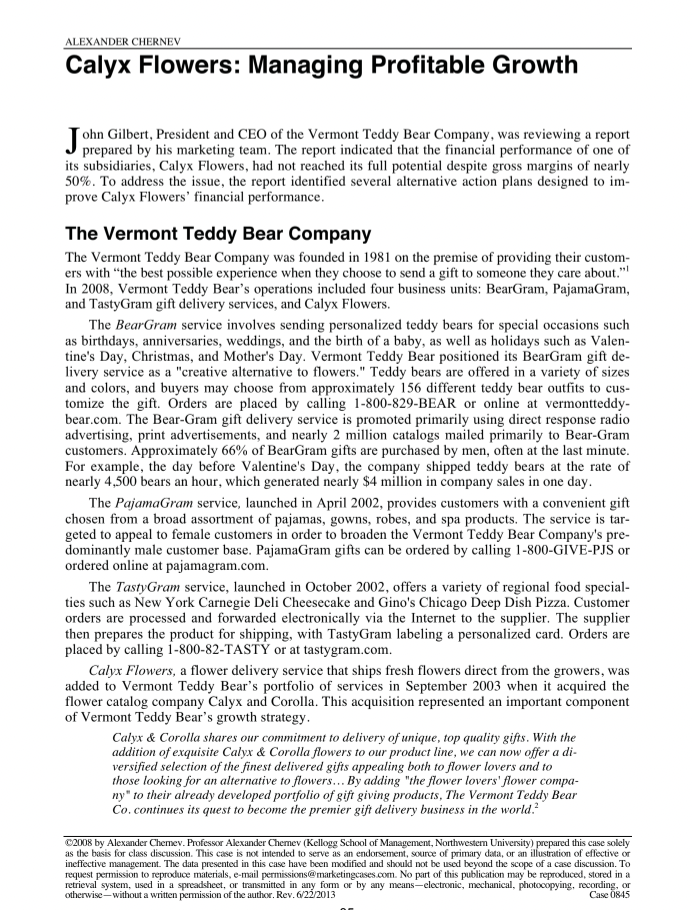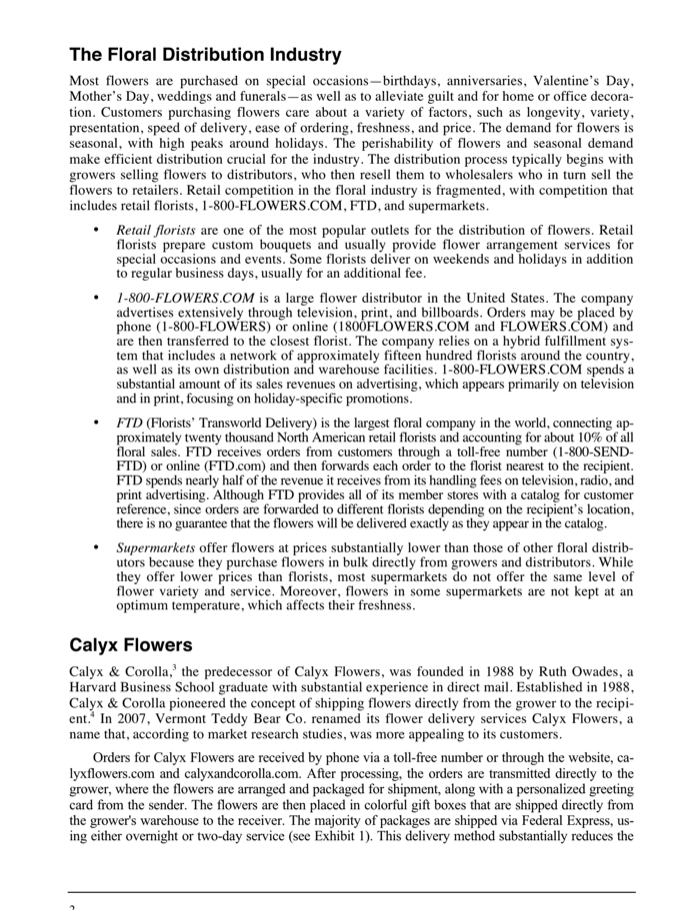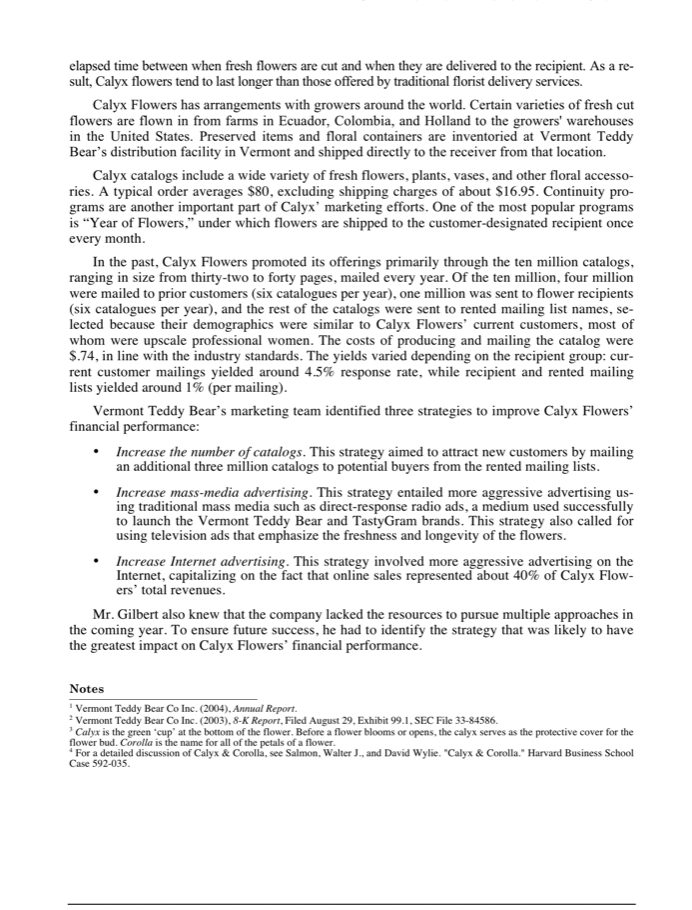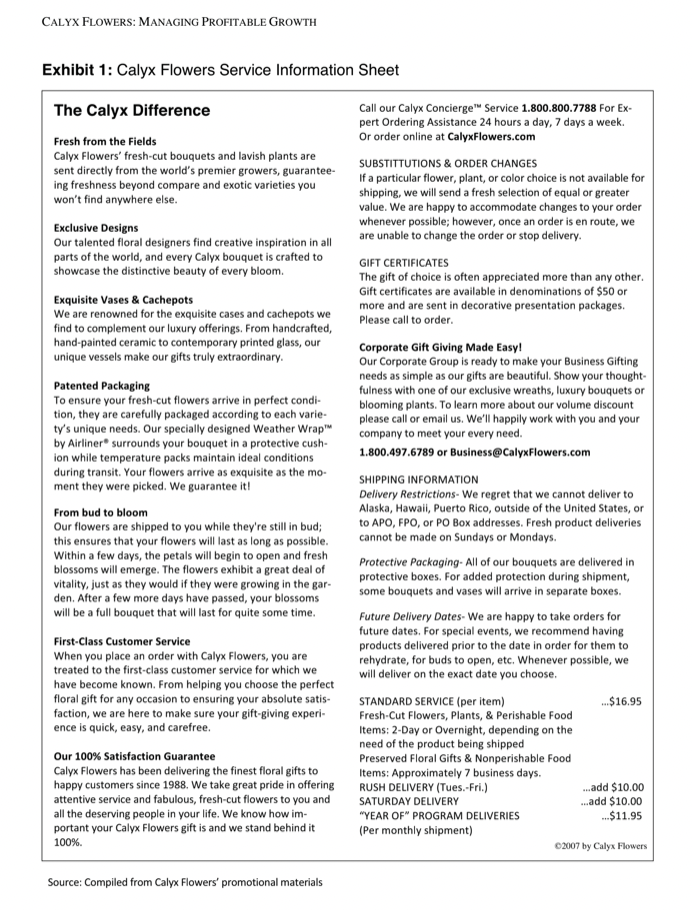Answered step by step
Verified Expert Solution
Question
1 Approved Answer
QUESTION- Summarize the case. What problem Calyx trying to solve? What is the key reason for the weak financial performance? Tohn Gilbert, President and CEO




QUESTION- Summarize the case. What problem Calyx trying to solve? What is the key reason for the weak financial performance?
Tohn Gilbert, President and CEO of the Vermont Teddy Bear Company, was reviewing a report prepared by his marketing team. The report indicated that the financial performance of one of its subsidiaries, Calyx Flowers, had not reached its full potential despite gross margins of nearly 50%. To address the issue, the report identified several alternative action plans designed to improve Calyx Flowers' financial performance. The Vermont Teddy Bear Company The Vermont Teddy Bear Company was founded in 1981 on the premise of providing their customers with "the best possible experience when they choose to send a gift to someone they care about." In 2008, Vermont Teddy Bear's operations included four business units: BearGram, PajamaGram, and TastyGram gift delivery services, and Calyx Flowers. The BearGram service involves sending personalized teddy bears for special occasions such as birthdays, anniversaries, weddings, and the birth of a baby, as well as holidays such as Valentine's Day, Christmas, and Mother's Day. Vermont Teddy Bear positioned its BearGram gift delivery service as a "creative alternative to flowers." Teddy bears are offered in a variety of sizes and colors, and buyers may choose from approximately 156 different teddy bear outfits to customize the gift. Orders are placed by calling 1-800-829-BEAR or online at vermontteddybear.com. The Bear-Gram gift delivery service is promoted primarily using direct response radio advertising, print advertisements, and nearly 2 million catalogs mailed primarily to Bear-Gram customers. Approximately 66% of BearGram gifts are purchased by men, often at the last minute. For example, the day before Valentine's Day, the company shipped teddy bears at the rate of nearly 4,500 bears an hour, which generated nearly $4 million in company sales in one day. The PajamaGram service, launched in April 2002, provides customers with a convenient gift chosen from a broad assortment of pajamas, gowns, robes, and spa products. The service is targeted to appeal to female customers in order to broaden the Vermont Teddy Bear Company's predominantly male customer base. PajamaGram gifts can be ordered by calling 1-800-GIVE-PJS or ordered online at pajamagram.com. The TastyGram service, launched in October 2002, offers a variety of regional food specialties such as New York Carnegie Deli Cheesecake and Gino's Chicago Deep Dish Pizza. Customer orders are processed and forwarded electronically via the Internet to the supplier. The supplier then prepares the product for shipping, with TastyGram labeling a personalized card. Orders are placed by calling 1-800-82-TASTY or at tastygram.com. Calyx Flowers, a flower delivery service that ships fresh flowers direct from the growers, was added to Vermont Teddy Bear's portfolio of services in September 2003 when it acquired the flower catalog company Calyx and Corolla. This acquisition represented an important component of Vermont Teddy Bear's growth strategy. Calyx \& Corolla shares our commitment to delivery of unique, top quality gifts. With the addition of exquisite Calyx \& Corolla flowers to our product line, we can now offer a diversified selection of the finest delivered gifts appealing both to flower lovers and to those looking for an alternative to flowers... By adding "the flower lovers' flower company" to their already developed portfolio of gift giving products, The Vermont Teddy Bear Co. continues its quest to become the premier gift delivery business in the world. 2 02008 by Alexander Chemev. Professor Alexander Chemev (Kellogg School of Management, Northwestem University) prepared this case solely as the basis for class discussion. This case is not intended to serve as an endorsement, source of primary data, or an illustration of effective or ineffective management. The data presented in this case have been modified and should not be used beyond the scope of a case discussion. To request permission to reproduce materials, e-mail permissions@marketingcases.oom. No part of this publication may be reproduced, stored in a retrieval system, used in a spreadsheet, or transmitted in any form or by any means-electronic, mechanical, photocopying, recording, or otherwise - without a written permission of the author. Rev. 6/22/2013 Case 0845 The Floral Distribution Industry Most flowers are purchased on special occasions-birthdays, anniversaries, Valentine's Day, Mother's Day, weddings and funerals - as well as to alleviate guilt and for home or office decoration. Customers purchasing flowers care about a variety of factors, such as longevity, variety, presentation, speed of delivery, ease of ordering, freshness, and price. The demand for flowers is seasonal, with high peaks around holidays. The perishability of flowers and seasonal demand make efficient distribution crucial for the industry. The distribution process typically begins with growers selling flowers to distributors, who then resell them to wholesalers who in turn sell the flowers to retailers. Retail competition in the floral industry is fragmented, with competition that includes retail florists, 1-800-FLOWERS.COM, FTD, and supermarkets. - Retail florists are one of the most popular outlets for the distribution of flowers. Retail florists prepare custom bouquets and usually provide flower arrangement services for special occasions and events. Some florists deliver on weekends and holidays in addition to regular business days, usually for an additional fee. - 1-800-FLOWERS.COM is a large flower distributor in the United States. The company advertises extensively through television, print, and billboards. Orders may be placed by phone (1-800-FLOWERS) or online (1800FLOWERS.COM and FLOWERS.COM) and are then transferred to the closest florist. The company relies on a hybrid fulfillment system that includes a network of approximately fifteen hundred florists around the country, as well as its own distribution and warehouse facilities. 1-800-FLOWERS.COM spends a substantial amount of its sales revenues on advertising, which appears primarily on television and in print, focusing on holiday-specific promotions. - FTD (Florists' Transworld Delivery) is the largest floral company in the world, connecting approximately twenty thousand North American retail florists and accounting for about 10% of all floral sales. FTD receives orders from customers through a toll-free number (1-800-SENDFTD) or online (FTD.com) and then forwards each order to the florist nearest to the recipient. FTD spends nearly half of the revenue it receives from its handling fees on television, radio, and print advertising. Although FTD provides all of its member stores with a catalog for customer reference, since orders are forwarded to different florists depending on the recipient's location, there is no guarantee that the flowers will be delivered exactly as they appear in the catalog. - Supermarkets offer flowers at prices substantially lower than those of other floral distributors because they purchase flowers in bulk directly from growers and distributors. While they offer lower prices than florists, most supermarkets do not offer the same level of flower variety and service. Moreover, flowers in some supermarkets are not kept at an optimum temperature, which affects their freshness. Calyx Flowers Calyx \& Corolla, 3 the predecessor of Calyx Flowers, was founded in 1988 by Ruth Owades, a Harvard Business School graduate with substantial experience in direct mail. Established in 1988 , Calyx \& Corolla pioneered the concept of shipping flowers directly from the grower to the recipient. 4 In 2007, Vermont Teddy Bear Co. renamed its flower delivery services Calyx Flowers, a name that, according to market research studies, was more appealing to its customers. Orders for Calyx Flowers are received by phone via a toll-free number or through the website, calyxflowers.com and calyxandcorolla.com. After processing, the orders are transmitted directly to the grower, where the flowers are arranged and packaged for shipment, along with a personalized greeting card from the sender. The flowers are then placed in colorful gift boxes that are shipped directly from the grower's warehouse to the receiver. The majority of packages are shipped via Federal Express, using either overnight or two-day service (see Exhibit 1). This delivery method substantially reduces the elapsed time between when fresh flowers are cut and when they are delivered to the recipient. As a result, Calyx flowers tend to last longer than those offered by traditional florist delivery services. Calyx Flowers has arrangements with growers around the world. Certain varieties of fresh cut flowers are flown in from farms in Ecuador, Colombia, and Holland to the growers' warehouses in the United States. Preserved items and floral containers are inventoried at Vermont Teddy Bear's distribution facility in Vermont and shipped directly to the receiver from that location. Calyx catalogs include a wide variety of fresh flowers, plants, vases, and other floral accessories. A typical order averages $80, excluding shipping charges of about $16.95. Continuity programs are another important part of Calyx' marketing efforts. One of the most popular programs is "Year of Flowers," under which flowers are shipped to the customer-designated recipient once every month. In the past, Calyx Flowers promoted its offerings primarily through the ten million catalogs, ranging in size from thirty-two to forty pages, mailed every year. Of the ten million, four million were mailed to prior customers (six catalogues per year), one million was sent to flower recipients (six catalogues per year), and the rest of the catalogs were sent to rented mailing list names, selected because their demographics were similar to Calyx Flowers' current customers, most of whom were upscale professional women. The costs of producing and mailing the catalog were $.74, in line with the industry standards. The yields varied depending on the recipient group: current customer mailings yielded around 4.5% response rate, while recipient and rented mailing lists yielded around 1% (per mailing). Vermont Teddy Bear's marketing team identified three strategies to improve Calyx Flowers' financial performance: - Increase the number of catalogs. This strategy aimed to attract new customers by mailing an additional three million catalogs to potential buyers from the rented mailing lists. - Increase mass-media advertising. This strategy entailed more aggressive advertising using traditional mass media such as direct-response radio ads, a medium used successfully to launch the Vermont Teddy Bear and TastyGram brands. This strategy also called for using television ads that emphasize the freshness and longevity of the flowers. - Increase Internet advertising. This strategy involved more aggressive advertising on the Internet, capitalizing on the fact that online sales represented about 40% of Calyx Flowers' total revenues. Mr. Gilbert also knew that the company lacked the resources to pursue multiple approaches in the coming year. To ensure future success, he had to identify the strategy that was likely to have the greatest impact on Calyx Flowers' financial performance. Notes Vermont Teddy Bear Co Inc. (2004). Annual Report. 2 Vermont Teddy Bear Co Inc. (2003), 8-K Report, Filed August 29, Exhibit 99.1, SEC File 33-84586. 'Calyx is the green 'cup' at the bottom of the flower. Before a flower blooms or opens, the calyx serves as the protective cover for the flower bud. Corolla is the name for all of the petals of a flower. "For a detailed discussion of Calyx \& Corolla, see Salmon, Walter J., and David Wylie. "Calyx \& Corolla." Harvard Business Sehool Case 592-035. Calyx Flowers: Managing Profitable Growth Exhibit 1: Calyx Flowers Service Information Sheet Source: Compiled from Calyx Flowers' promotional materials Tohn Gilbert, President and CEO of the Vermont Teddy Bear Company, was reviewing a report prepared by his marketing team. The report indicated that the financial performance of one of its subsidiaries, Calyx Flowers, had not reached its full potential despite gross margins of nearly 50%. To address the issue, the report identified several alternative action plans designed to improve Calyx Flowers' financial performance. The Vermont Teddy Bear Company The Vermont Teddy Bear Company was founded in 1981 on the premise of providing their customers with "the best possible experience when they choose to send a gift to someone they care about." In 2008, Vermont Teddy Bear's operations included four business units: BearGram, PajamaGram, and TastyGram gift delivery services, and Calyx Flowers. The BearGram service involves sending personalized teddy bears for special occasions such as birthdays, anniversaries, weddings, and the birth of a baby, as well as holidays such as Valentine's Day, Christmas, and Mother's Day. Vermont Teddy Bear positioned its BearGram gift delivery service as a "creative alternative to flowers." Teddy bears are offered in a variety of sizes and colors, and buyers may choose from approximately 156 different teddy bear outfits to customize the gift. Orders are placed by calling 1-800-829-BEAR or online at vermontteddybear.com. The Bear-Gram gift delivery service is promoted primarily using direct response radio advertising, print advertisements, and nearly 2 million catalogs mailed primarily to Bear-Gram customers. Approximately 66% of BearGram gifts are purchased by men, often at the last minute. For example, the day before Valentine's Day, the company shipped teddy bears at the rate of nearly 4,500 bears an hour, which generated nearly $4 million in company sales in one day. The PajamaGram service, launched in April 2002, provides customers with a convenient gift chosen from a broad assortment of pajamas, gowns, robes, and spa products. The service is targeted to appeal to female customers in order to broaden the Vermont Teddy Bear Company's predominantly male customer base. PajamaGram gifts can be ordered by calling 1-800-GIVE-PJS or ordered online at pajamagram.com. The TastyGram service, launched in October 2002, offers a variety of regional food specialties such as New York Carnegie Deli Cheesecake and Gino's Chicago Deep Dish Pizza. Customer orders are processed and forwarded electronically via the Internet to the supplier. The supplier then prepares the product for shipping, with TastyGram labeling a personalized card. Orders are placed by calling 1-800-82-TASTY or at tastygram.com. Calyx Flowers, a flower delivery service that ships fresh flowers direct from the growers, was added to Vermont Teddy Bear's portfolio of services in September 2003 when it acquired the flower catalog company Calyx and Corolla. This acquisition represented an important component of Vermont Teddy Bear's growth strategy. Calyx \& Corolla shares our commitment to delivery of unique, top quality gifts. With the addition of exquisite Calyx \& Corolla flowers to our product line, we can now offer a diversified selection of the finest delivered gifts appealing both to flower lovers and to those looking for an alternative to flowers... By adding "the flower lovers' flower company" to their already developed portfolio of gift giving products, The Vermont Teddy Bear Co. continues its quest to become the premier gift delivery business in the world. 2 02008 by Alexander Chemev. Professor Alexander Chemev (Kellogg School of Management, Northwestem University) prepared this case solely as the basis for class discussion. This case is not intended to serve as an endorsement, source of primary data, or an illustration of effective or ineffective management. The data presented in this case have been modified and should not be used beyond the scope of a case discussion. To request permission to reproduce materials, e-mail permissions@marketingcases.oom. No part of this publication may be reproduced, stored in a retrieval system, used in a spreadsheet, or transmitted in any form or by any means-electronic, mechanical, photocopying, recording, or otherwise - without a written permission of the author. Rev. 6/22/2013 Case 0845 The Floral Distribution Industry Most flowers are purchased on special occasions-birthdays, anniversaries, Valentine's Day, Mother's Day, weddings and funerals - as well as to alleviate guilt and for home or office decoration. Customers purchasing flowers care about a variety of factors, such as longevity, variety, presentation, speed of delivery, ease of ordering, freshness, and price. The demand for flowers is seasonal, with high peaks around holidays. The perishability of flowers and seasonal demand make efficient distribution crucial for the industry. The distribution process typically begins with growers selling flowers to distributors, who then resell them to wholesalers who in turn sell the flowers to retailers. Retail competition in the floral industry is fragmented, with competition that includes retail florists, 1-800-FLOWERS.COM, FTD, and supermarkets. - Retail florists are one of the most popular outlets for the distribution of flowers. Retail florists prepare custom bouquets and usually provide flower arrangement services for special occasions and events. Some florists deliver on weekends and holidays in addition to regular business days, usually for an additional fee. - 1-800-FLOWERS.COM is a large flower distributor in the United States. The company advertises extensively through television, print, and billboards. Orders may be placed by phone (1-800-FLOWERS) or online (1800FLOWERS.COM and FLOWERS.COM) and are then transferred to the closest florist. The company relies on a hybrid fulfillment system that includes a network of approximately fifteen hundred florists around the country, as well as its own distribution and warehouse facilities. 1-800-FLOWERS.COM spends a substantial amount of its sales revenues on advertising, which appears primarily on television and in print, focusing on holiday-specific promotions. - FTD (Florists' Transworld Delivery) is the largest floral company in the world, connecting approximately twenty thousand North American retail florists and accounting for about 10% of all floral sales. FTD receives orders from customers through a toll-free number (1-800-SENDFTD) or online (FTD.com) and then forwards each order to the florist nearest to the recipient. FTD spends nearly half of the revenue it receives from its handling fees on television, radio, and print advertising. Although FTD provides all of its member stores with a catalog for customer reference, since orders are forwarded to different florists depending on the recipient's location, there is no guarantee that the flowers will be delivered exactly as they appear in the catalog. - Supermarkets offer flowers at prices substantially lower than those of other floral distributors because they purchase flowers in bulk directly from growers and distributors. While they offer lower prices than florists, most supermarkets do not offer the same level of flower variety and service. Moreover, flowers in some supermarkets are not kept at an optimum temperature, which affects their freshness. Calyx Flowers Calyx \& Corolla, 3 the predecessor of Calyx Flowers, was founded in 1988 by Ruth Owades, a Harvard Business School graduate with substantial experience in direct mail. Established in 1988 , Calyx \& Corolla pioneered the concept of shipping flowers directly from the grower to the recipient. 4 In 2007, Vermont Teddy Bear Co. renamed its flower delivery services Calyx Flowers, a name that, according to market research studies, was more appealing to its customers. Orders for Calyx Flowers are received by phone via a toll-free number or through the website, calyxflowers.com and calyxandcorolla.com. After processing, the orders are transmitted directly to the grower, where the flowers are arranged and packaged for shipment, along with a personalized greeting card from the sender. The flowers are then placed in colorful gift boxes that are shipped directly from the grower's warehouse to the receiver. The majority of packages are shipped via Federal Express, using either overnight or two-day service (see Exhibit 1). This delivery method substantially reduces the elapsed time between when fresh flowers are cut and when they are delivered to the recipient. As a result, Calyx flowers tend to last longer than those offered by traditional florist delivery services. Calyx Flowers has arrangements with growers around the world. Certain varieties of fresh cut flowers are flown in from farms in Ecuador, Colombia, and Holland to the growers' warehouses in the United States. Preserved items and floral containers are inventoried at Vermont Teddy Bear's distribution facility in Vermont and shipped directly to the receiver from that location. Calyx catalogs include a wide variety of fresh flowers, plants, vases, and other floral accessories. A typical order averages $80, excluding shipping charges of about $16.95. Continuity programs are another important part of Calyx' marketing efforts. One of the most popular programs is "Year of Flowers," under which flowers are shipped to the customer-designated recipient once every month. In the past, Calyx Flowers promoted its offerings primarily through the ten million catalogs, ranging in size from thirty-two to forty pages, mailed every year. Of the ten million, four million were mailed to prior customers (six catalogues per year), one million was sent to flower recipients (six catalogues per year), and the rest of the catalogs were sent to rented mailing list names, selected because their demographics were similar to Calyx Flowers' current customers, most of whom were upscale professional women. The costs of producing and mailing the catalog were $.74, in line with the industry standards. The yields varied depending on the recipient group: current customer mailings yielded around 4.5% response rate, while recipient and rented mailing lists yielded around 1% (per mailing). Vermont Teddy Bear's marketing team identified three strategies to improve Calyx Flowers' financial performance: - Increase the number of catalogs. This strategy aimed to attract new customers by mailing an additional three million catalogs to potential buyers from the rented mailing lists. - Increase mass-media advertising. This strategy entailed more aggressive advertising using traditional mass media such as direct-response radio ads, a medium used successfully to launch the Vermont Teddy Bear and TastyGram brands. This strategy also called for using television ads that emphasize the freshness and longevity of the flowers. - Increase Internet advertising. This strategy involved more aggressive advertising on the Internet, capitalizing on the fact that online sales represented about 40% of Calyx Flowers' total revenues. Mr. Gilbert also knew that the company lacked the resources to pursue multiple approaches in the coming year. To ensure future success, he had to identify the strategy that was likely to have the greatest impact on Calyx Flowers' financial performance. Notes Vermont Teddy Bear Co Inc. (2004). Annual Report. 2 Vermont Teddy Bear Co Inc. (2003), 8-K Report, Filed August 29, Exhibit 99.1, SEC File 33-84586. 'Calyx is the green 'cup' at the bottom of the flower. Before a flower blooms or opens, the calyx serves as the protective cover for the flower bud. Corolla is the name for all of the petals of a flower. "For a detailed discussion of Calyx \& Corolla, see Salmon, Walter J., and David Wylie. "Calyx \& Corolla." Harvard Business Sehool Case 592-035. Calyx Flowers: Managing Profitable Growth Exhibit 1: Calyx Flowers Service Information Sheet Source: Compiled from Calyx Flowers' promotional materialsStep by Step Solution
There are 3 Steps involved in it
Step: 1

Get Instant Access to Expert-Tailored Solutions
See step-by-step solutions with expert insights and AI powered tools for academic success
Step: 2

Step: 3

Ace Your Homework with AI
Get the answers you need in no time with our AI-driven, step-by-step assistance
Get Started


